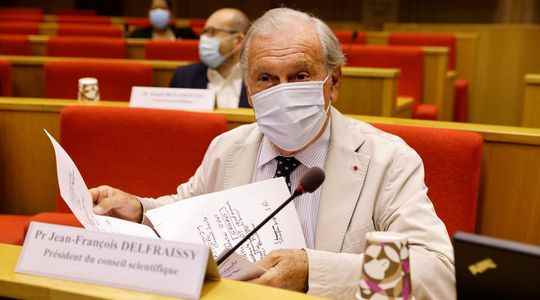Little by little, the long masked face of Jean-François Delfraissy ended up imposing itself in the daily life of the French. Since the first and up to the seventh wave of the epidemic (still ongoing today), he has never stopped preventing, alerting, qualifying and reassuring. But after two and a half years of activity, Professor Delfraissy has announced that he will be leaving his post on July 31. With him, the Scientific Council is preparing to close its doors for good.
At the same time, France will also emerge from the state of health emergency, while the seventh wave of Covid-19 seems to have stagnated, even subsided in recent days.
90 opinions issued since the start of the epidemic
Founded in mid-March 2020 at the request of Emmanuel Macron, it has provided the government and the French with the latest scientific information as the Covid-19 epidemic evolves. In his introductory statement in March 2020, the former Minister of Health Olivier Véran explained the common desire with the Head of State to “innovate in the governance of public decision-making” through the creation of a scientific committee , emphasizing its necessary “flexible, agile and sufficiently responsive” operation.
Since then, the council’s scientists have issued nearly 90 opinions or notes on the health situation in the country and the possible means of countering the epidemic waves. Among them, infectiologists, epidemiologists, caregivers, or even specialists in the human sciences (anthropologist, sociologist), reinforced after a few months by six other experts (geriatrician, veterinarian, child psychiatrist, etc.) carried out a delicate exercise and sometimes controversial, between science, education, and health management. “We shared a lot of defeats and successes, sometimes complicated relations with politics. We learned to have humility, to say when we did not know”, summarized Professor Jean-François Delfraissy, during a final virtual press conference this Thursday, July 21.
“The fact that the members of the Scientific Council have changed little or not at all along the way has ensured a continuity that guarantees independent expertise, analyzes epidemiologist Mircea Sofonea in the columns of the World. It has succeeded in maintaining a delicate balance between science, research and health management by being a sounding board for the scientific community.” Nevertheless, criticisms have been made several times by patient associations, accusing the council of not having never been represented.
The executive is far from having always followed their recommendations, or else delayed for certain confinements. It has also delayed several times in issuing its opinions. Moreover, the immunologist conceded that the Scientific Council has “surely” been instrumentalized. “By us, by you [NDLR : les médias]by politicians”. Over the months, Jean-François Delfraissy, rather cash and alarmist at the start of the pandemic, had learned to make more nuanced statements, in particular about vaccination or the need to confine the French. .
A monitoring committee should take over
After the dismantling of the Scientific Council on July 31, a “committee for monitoring and anticipating health risks” should take over on issues related to the Covid-19 epidemic, but not only. The Ministry of Health confirmed to AFP on Thursday the creation of a “permanent advisory committee”, which must be set up “in the weeks to come”. Its objective will be “to ensure a monitoring and anticipation role as well as an advisory role when new health crises arise”. It will be created on the same principles of “independence, transparency and agility” as the Scientific Council in order to be complementary to the already existing agencies. As “the risks evolve”, “not only infectious but also linked to the quality of air, water and land, to the impact of climate change”, the Minister of Health François Braun considers “essential (…) a permanent committee, made up of various scientific disciplines” and following the “One Health” approach, “which considers human, animal and plant health together in a healthy environment”, indicated his office to AFP .
But the government still has to formalize the creation, a priori by decree, and the composition of this body placed under the Ministers of Health and Research. It is not excluded that some members of the Scientific Council are part of it. Jean-François Delfraissy has already made known his wish to leave the board definitively. “I’ve only thought Covid for 24 months, it’s time for a fresh vision, it’s time to hand over.”
Latest Recommendations
And before leaving for good, Professor Delfraissy made final recommendations in his last notice, published Tuesday, July 19. A 60-page note entitled: “Living with variants, the pandemic is not over”. “We have done part of the job but there is still a lot to do, the pandemic is not over,” he said at Thursday’s press conference.
The text reveals that the peak of the BA.4/BA.5 wave is “on the way to being reached in France”, but fears future “epidemic outbreaks associated with the emergence of new variants, more accentuated in the autumn period. winter”. In the medium term, the body suggests “successive adaptations of vaccines” in the event that the next waves prove to be more severe. But at a shorter time frame, the board is developing three scenarios.
Finally, the Scientific Council suggests ways to improve the relationship between political and scientific bodies, in particular through the creation of a group of high-level scientists to inform the President of the Republic and the Prime Minister on advances in science, and this, regardless of crises. “Covid-19 has shown the major importance that information and advice or opinions based on the state of scientific knowledge could have to inform political decisions. Faced with this type of collective challenge, science is not an option. This period also confirms that the scientific world and the world of political decision-makers have not had, until now, enough regular contact”, conclude the authors of the final opinion.
